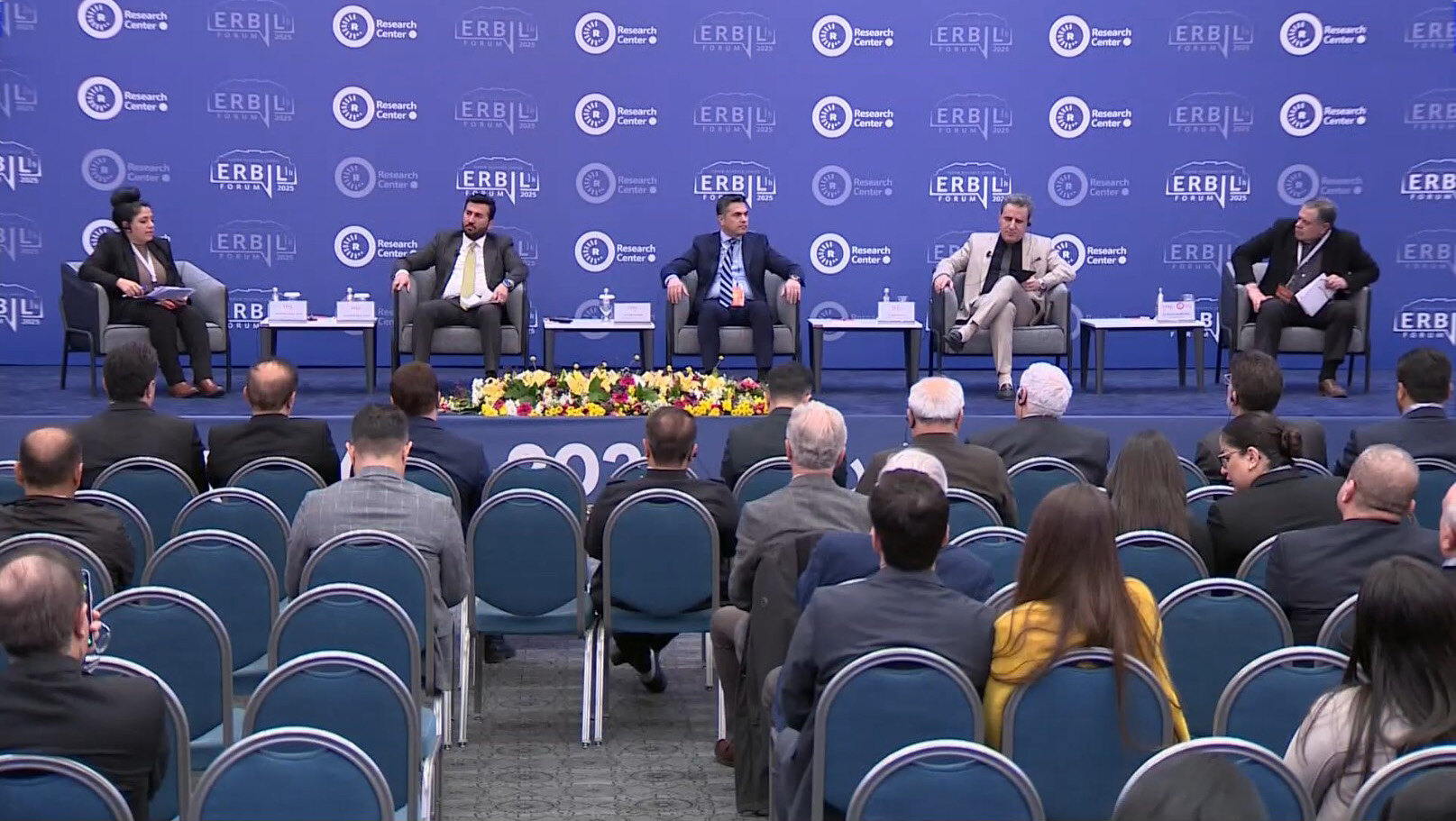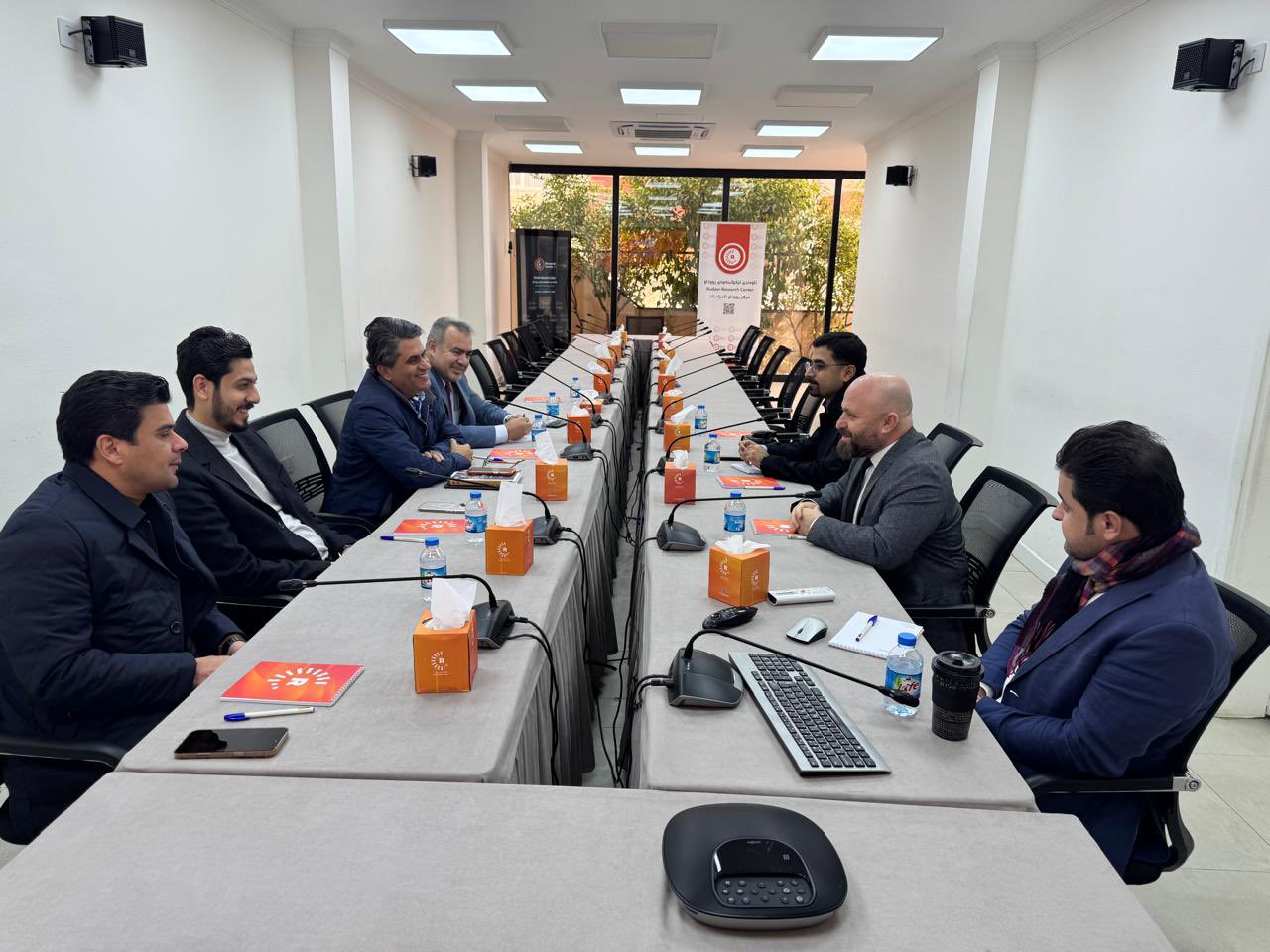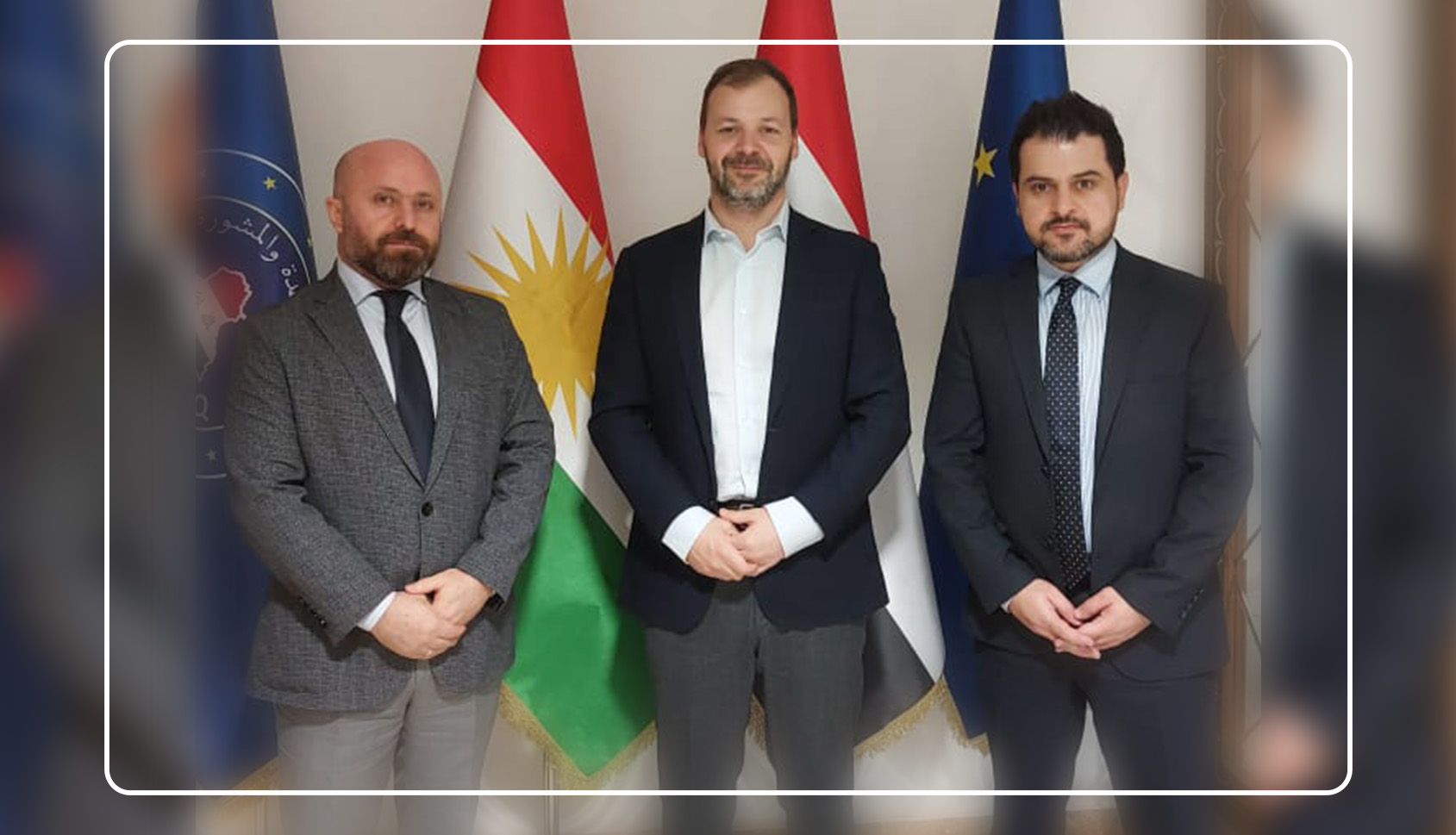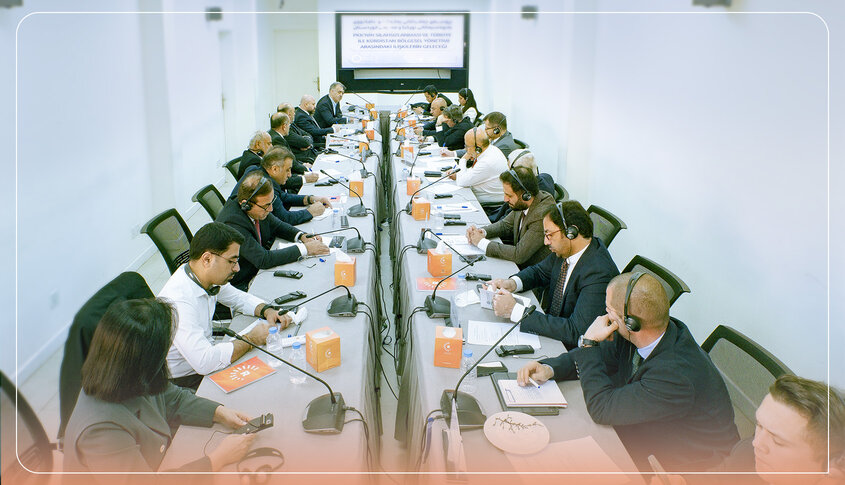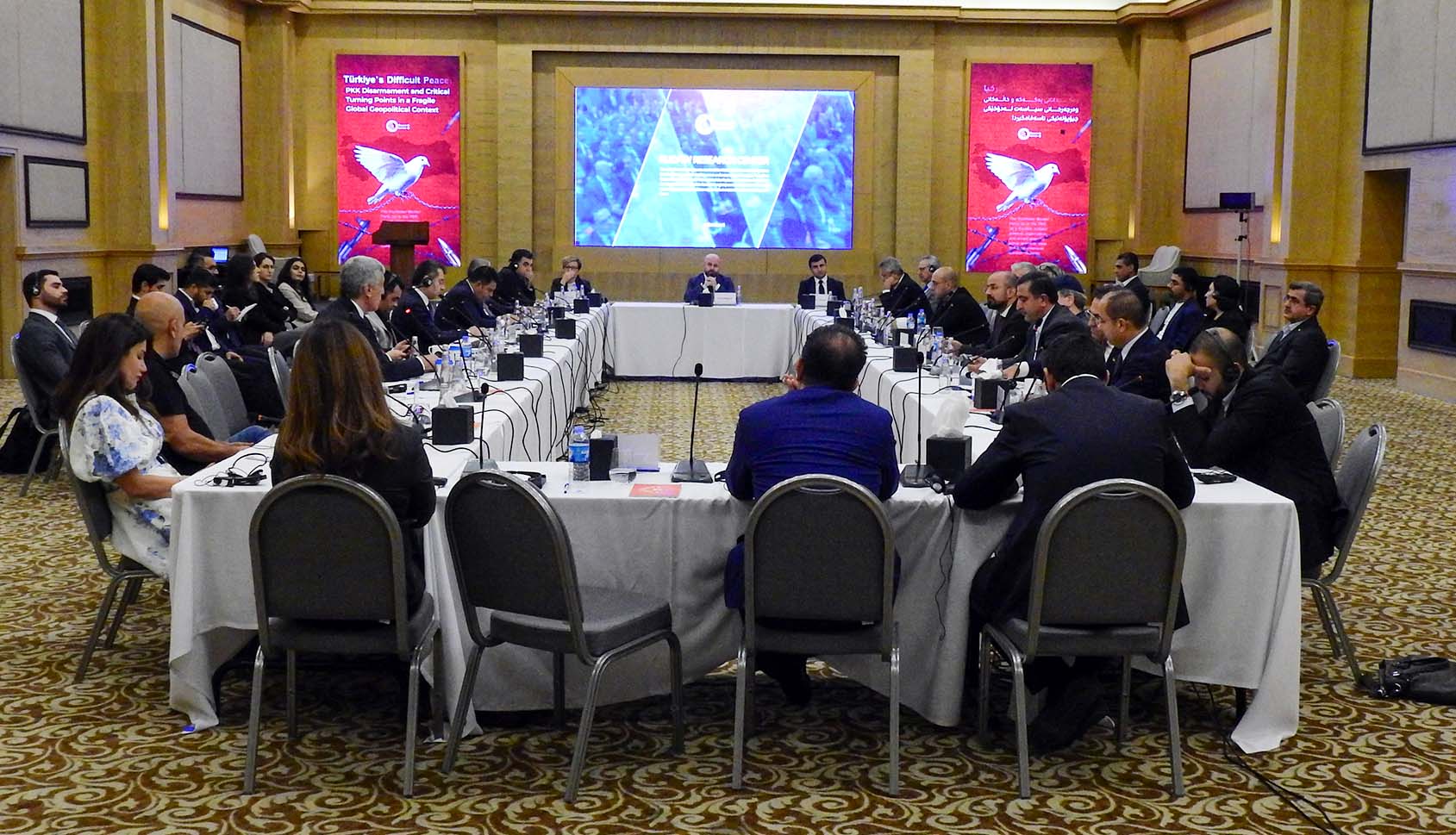Panel 11: Competitiveness of Road Projects and the Future of Development Road Projects in Iraq
11-04-2025
Maryam:
Thank you very much, and good morning, everyone. I appreciate you all being here today. We are gathered here to discuss a very important topic: Iraq's Development Road Project. This project has been making headlines recently due to its potential to enhance connectivity between Iraq, Europe, Asia, and the broader Middle East region.
Beyond its logistical impact, the project also has the potential to elevate Iraq's diplomatic role, granting it political prestige while influencing the flow of trade for key commodities. However, its implementation requires a careful balancing of various complexities, including political, economic, and social factors.
To discuss these issues in depth, I am joined today by four esteemed panelists. We have Dr. Ahmed Yousef Al-Jumaili from the Prime Minister's political team; Dr. Yerevan Saeed, Director of the Global Kurdish Initiative for Peace at the American University in Washington; Dr. Ardeshir Pashang, a researcher and expert in international relations; and, at the far end—where I have to lean forward to see him—Dr. Ahmad Naqibzadeh, a professor at the University of Tehran.
Since we have been allocated 40 minutes for this discussion, as informed by Rudolph, I suggest we dive straight into the questions.
Dr. Ahmed Yousef Al-Jumaili, the Development Road Project presents a significant opportunity for Iraq's future, with the potential to deliver substantial economic benefits to the country as a whole. In your opinion, how do you view this project within the framework of the government's efforts to enhance connectivity? Additionally, could you highlight some recent achievements in the project's rollout so far? Lastly, what strategic measures do you believe are necessary to ensure the successful implementation of such a large-scale initiative?
Ahmad al-Jumaili:
In the name of God, the Almighty, the Merciful, I would like to express my gratitude to the Rudaw Research Center for this invitation, for organizing this conference, and for preparing this important panel and discussion on a crucial strategic project—the Development Road Project.
Many questions have arisen regarding what this project entails, its components, the opportunities it offers, and the challenges it faces. This places a responsibility on us as Iraqis—the government, institutions, political forces, and social and cultural elites—to implement this project and bring it to life in a way that fosters development and strengthens Iraq’s position.
It is evident that Iraq’s economy relies heavily on oil revenues, constituting about 90% of the national income, while facing a semi-destroyed infrastructure due to the aimless wars and crises the country has endured over the years. This, compounded by corruption, waste of public funds, and a range of other issues, the most significant being a lack of job opportunities, has made progress difficult.
According to the latest research, Iraq needs more than 350,000 jobs annually. Yet, about one million people enter the labor market each year. This challenge has prompted the government to address these realities, incorporating the necessary solutions and strategic plans in its service program to achieve long-term, sustainable development.
The concept of building the Faw Port and the Development Road is not new, having been proposed under various names since the 1980s. However, what is new is that the current government under Prime Minister Al-Sudani has made this project a top priority. It is now positioned as a catalyst in the transition of Iraq’s economy to a diversified one that ensures sustainable growth.
The issue of development and how to achieve it requires a shift in the state’s economic philosophy. As we all know, our current approach does not solve the country’s problems, and, in fact, exacerbates them. Iraq has experienced stability in recent years, thanks to God, following the victory over ISIS, which has made Iraq an important and attractive investment environment.
This shift in fortune is not accidental. Several companies and investors from the Gulf, the United States, and the West have begun entering Iraq to capitalize on these valuable investment opportunities.
This foreign policy approach is pursued by the government, which emphasizes the convergence of interests, addressing economic and regional complementarity, and adopting a principle of productive diplomacy while avoiding superficial politics. Iraq is working to maintain a balanced policy that offers many opportunities to overcome the numerous crises and challenges it faces. From this perspective, the government has embarked on implementing the Development Road Project.
The project, with all its components, is not only a railway and land route, but it also shortens the distance between Asia and Europe from about 33 days to approximately 15 days. In addition, this project includes the development of industrial towns. According to the Faw Port Master Plan, the port will feature an economic city that is expected to become one of the largest economic hubs in the Middle East. Furthermore, there is a contract in place to build the Faw refinery, with a capacity of 150,000 barrels per day, another 150,000 barrels for petrochemical production, and a stable platform for gas.
These activities add significant economic value to the Development Road project. Unfortunately, the project has not received adequate media coverage. Many have attempted to lower expectations surrounding the project, but thankfully, real steps have already been taken on the ground, and if all goes as planned, we will see its continued progress in the future.
Oliver Wyman is responsible for designing the industrial cities that will be built along the Development Road corridor. These cities are not being constructed randomly; they are based on logistics and other strategic factors.
The Development Road project and its main corridor will be connected to additional side corridors, ensuring that no province is excluded from this initiative. Additionally, the project will include connectivity and complementarity projects with neighboring regional countries, offering real investment opportunities for regional and international investors and companies.
Currently, the project is in the design phase, with further detailed studies and preparations for economic and financial models. A significant portion of this phase has already been completed. For example, the economic schedule is 100% complete, and the preliminary designs for the railway and overland routes are also 100% finalized. We have entered the detailed design phase, with the railway project reaching 64% completion and the dry roads at about 60%.
The Faw Port is also planned for completion later this year. The road connecting Faw to the Port of Muqasar has reached 96% completion, the shipping canal is at 81%, the container terminal is at 84%, and the underwater tunnel is nearing completion.
The government is currently passing a special law to facilitate investment in Faw Port and the Development Road. This law will serve as a legal framework for companies and investors interested in investing in Iraq. Additionally, a study is underway to establish an executive committee to oversee and manage the project.
On the security front, the Prime Minister has instructed the Joint Forces Command to prepare a comprehensive security plan to protect the Development Road. Furthermore, a high-level committee focused on the Development Road was established from the outset, chaired by the Prime Minister.
As we have mentioned, the Development Road project is not solely a railway and land corridor but also includes other corridors, such as energy corridors (for oil and gas) and communication corridors (for light cables, etc.). This project, with its residential cities and economic zones, is expected to create thousands of new jobs.
According to the Ministry of Commerce, Iraq imports goods worth $70 billion annually. If, God willing, the economic and industrial cities are completed and the factories are established, Iraq will be able to meet most of its domestic market needs and export the remainder to other countries.
The Development Road project is a significant and crucial initiative as it provides a genuine opportunity for the private sector. The private sector in Iraq is beginning to grow and emerge, supported by state incentives, sovereignty guarantees for the first time, and other laws that facilitate investment.
Furthermore, the economic sector stands before a real opportunity for partnerships and investments presented by the components of the Development Road. This project has long-term strategic importance. Some argue that the Development Road will yield little, with the common perception being that it is merely a route for goods to pass. However, as everyone knows, the issue has expanded beyond whether the route will be profitable. Despite the regional consequences of the Gaza war, the Iraqi government has approached the World Bank to accelerate the implementation of the Development Road.
Mariam:
Thank you very much, Dr. Al-Jumaili, for setting the stage. It is encouraging to hear about the progress made so far in advancing the project.
I would now like to turn to Dr. Yerevan. Dr. Yerevan, as Dr. Al-Jumaili mentioned, significant progress has already been made in rolling out the project. However, with initiatives of this scale, there are numerous political and economic considerations that must be carefully navigated. Some analysts suggest that the project could become a competitor to China's Belt and Road Initiative (BRI) or even to other Gulf-based infrastructure networks.
In your opinion, what key metrics should be targeted to ensure the successful realization of this project while balancing the intricate political and economic factors involved?
Dr. Yareevan:
Thank you. It's truly a pleasure to be here. I appreciate the invitation and extend my thanks to the distinguished panelists.
The discussion today revolves around the benefits of the Iran Development Road (IDR)—its potential impact on Iran's economy and its future prospects. However, for a mega project of this scale to succeed, several critical factors must be considered.
There are three key elements essential for the success of a multi-billion-dollar project like this:
Political stability – Without a stable political environment, long-term infrastructure projects face significant risks.
Foreign investment – The ability to attract international investors is crucial for funding and sustaining such an ambitious initiative.
Economic viability – The project's overall feasibility, including its impact on global trade and cost-effectiveness, will determine whether it achieves its intended goals.
The IDR is highly ambitious—it aims to divert 10-15% of global trade from the Suez Canal and reroute it through Iraq, significantly reducing delivery times for goods traveling from China to Europe, from 30-50 days to approximately 12-18 days.
However, this project originates in a historically volatile region—Iraq’s Basra area—which has long been a flashpoint for conflict, including during the Iran-Iraq War. Additionally, Iraq's complicated relations with Kuwait further complicate matters, as Kuwait is displeased with the project’s route. Similarly, Iran, which has its own overland trade routes via Bandar Abbas and is developing the Chabahar port to compete with Jebel Ali in the UAE, is not entirely supportive.
Beyond regional rivalries, security remains a major concern. In the north, where the development road terminates, there are ongoing conflicts, particularly involving the Kurdish insurgency and the PKK. Although PKK leader Abdullah Öcalan recently called for an end to the armed struggle, the Kurdistan Region still feels excluded from the project.
Looking at the IDR’s route begins in Basra, passes through Zubair, and then winds through several Shia-majority provinces, including Diwaniya, Nasiriyah, Najaf, Hillah, and Baghdad, before reaching Mosul. Instead of taking a more direct and efficient route through Duhok and into Turkey via the Fishkhabour border crossing, it detours in a way that has raised concerns, particularly in the Kurdistan Region and Kuwait.
Moreover, Iraq faces severe governance and security challenges. The country is fragmented, with various militia groups exerting influence, often competing for resources and contracts. Given the scale of the IDR, it will undoubtedly attract significant attention, including corruption and bribery.
Corruption is another major obstacle. Iraq ranks 140th out of 180 countries in global corruption indices, which significantly discourages foreign investment. The very process of awarding the feasibility study for the IDR lacked transparency—it was given to the Italian company PEG, despite criticisms over its selection and doubts about its expertise in handling a project of this magnitude.
Policy continuity is another crucial factor. Iraq’s power structure is fragmented, and any prime minister who successfully pushes this project forward would gain significant political leverage. However, the question remains whether Prime Minister Sudani can secure support from political parties and parliamentary approval for the necessary funding. So far, no budget has been allocated for even the initial stages of the project.
I'll stop here for now.
Maryam:
You raise some very interesting points, Dr. Yerevan. That brings me to Dr. Ardeshir. Large-scale projects like this in Iraq are often criticized for being hindered by political instability and security issues. Instead of driving economic growth, they frequently face delays and obstacles. Given these challenges, do you agree that such projects struggle to achieve their intended goals? Additionally, as Dr. Yerevan pointed out, the exclusion of the Kurdistan Region raises further concerns.
Dr. Ardeshir Pashang:
Greetings to the audience. Thank you for this opportunity and for your question. I would like to discuss why the geopolitics of the Middle East, where we are witnessing wars and crises, affects ideologies and ethnic minorities. We are currently in a time of crisis and competition over key corridors.
I want to address several key issues:
First, why in the Middle East, a project such as the development corridor, instead of bringing states closer together and fostering peace and stability, ends up deepening crises or leading to the emergence of new and different crises.
Second, the position and situation of two very different actors in the region, namely the Islamic Republic of Iran and the Kurdistan Regional Government, and their relations with each other. This dynamic will definitely affect the development of the corridors.
Third, will the Imrali reconciliation process change the development corridor project, particularly the one passing through Mosul and into the Kurdistan Region?
Additionally, how can Iran and the Kurdistan Regional Government be ready to cooperate on the various roads and corridors that are emerging in this region?
At the School of International Relations, we have a section on liberalism that discusses how economic cooperation between two or more countries contributes to political and security cooperation. One of the best examples of this is the six-nation cooperation in 1945, which lasted until 1957 and eventually evolved into the European Union. However, in the Middle East, we are not witnessing similar cooperation. As you mentioned earlier, this is not the case, and I will briefly touch on the main issues. These include geopolitical differences, historical grievances, and the ongoing ideological crisis in the region, whether related to religion, ethnicity, or nationalism—be it Turkish, Arab, Iranian, or Kurdish nationalism. Indeed, this has been a crisis-ridden, unresolved competition that has weakened governments.
Looking at the European Union, we can see that most countries were democracies by the 1940s and 1950s, with varying degrees of democracy. However, in the Middle East, the situation is quite different, with governments in the region facing internal problems and ongoing dictatorships. Another issue is the lack of leaders who can work together to transform cooperation into economic partnerships and reduce tensions. When this does not happen, the Middle East remains distinct from other regions. Road projects and corridors have only renewed problems rather than resolving them.
A second issue involves the roles of two actors: one is an established entity, the Islamic Republic of Iran, and the other is a new player in the region—the Kurdistan Regional Government within the Federal Republic of Iraq. There are eight strategic corridors in the Middle East, starting in China:
The Silk Railway, which runs from China through Kyrgyzstan and then through Russia to Europe.
The Silk Road, which starts in China and runs through Iran, partially through Iraq, and the Kurdistan Region.
Another route connects India, Egypt, the UAE, and Djibouti to Europe, linking these countries.
A fourth route leads from India, Qatar, the UAE, Turkey, and Syria back to Europe.
The fifth is the Blue Road, which runs from Afghanistan, Kazakhstan, Kyrgyzstan, Turkmenistan, and Azerbaijan to Turkey and from there to Europe.
The sixth is the Aidmak corridor, which extends to Europe via India, the UAE, Saudi Arabia, Jordan, and Israel. I would like to point out that one of the reasons for the October 7 conflict was to oppose this route that connects Israel and Arab states to India.
The seventh is the development corridor, which runs through the Gulf, the UAE, and Qatar, linking Iraq—both Sunni and Shiite—to Turkey.
As we can see, in all of these corridors, both an established player like Iran and a new actor like the Kurdistan Regional Government have only a very small share in one corridor, with no involvement in the others. This highlights the problems in the region. Iran, as a regional power, is viewed unfavorably by world powers, and even regional countries like Turkey have reservations about Iran's growing influence. An example of this shift was the change in Syria last year when Ahmad Shara overthrew a strategic ally of Iran. All of this has contributed to Iran becoming a marginalized actor in these projects.
The Kurdistan Region, despite its growing importance in Middle Eastern affairs, has a small share in these initiatives and faces significant pressures. The situation of these two actors in the region is different, and therefore, we can conclude that the corridor projects are against both Iran and the Kurdistan Region.
Mariam:
I have just been informed by Rudolph that we are being followed by a high-profile interview, so we have only five minutes left to conclude our panel. I will need to move quickly to Dr. Ahmed for his question. Thank you.
Well, that is unfortunate.
Dr. Ahmed Naqibzadeh, I would like to ask you—our colleagues have already discussed the key requirements for the successful implementation of this project, particularly regarding the political and security climate in the region. We are also witnessing potential diplomatic initiatives and growing investor interest in such projects.
Could you highlight some of the key metrics a project like this would need to consider in order to attract investment? Additionally, regarding the future of other corridor projects in the region, what steps would be necessary to ensure their success?
Ahmad Naqibzadeh:
Thank you, and greetings to the audience.
I have a few points. In fact, friends have pointed out various projects, but I am personally very pessimistic. The situation in the Middle East is dire, similar to the conditions in the Balkans at the start of World War I, for exactly the same reasons.
Unless we resolve the issues related to the different ethnic, cultural, and linguistic identities in the region, the Middle East will remain a crisis-prone area. For this reason, I believe that unless these problems are addressed, this region will continue to be a flashpoint for conflict.
Such approaches may have been acceptable in the past. For example, in the 16th century, the Safavids forcibly converted people to Shi’ism in Iran; meanwhile, Louis XIV in France forced everyone to be Catholic and imposed the courtly language on society. But today, such practices are outdated and belong to the past.
These changes are critical, and states must accept that such policies are no longer viable. States must either address the situation of these minorities through freedom and democracy or respond in other ways. Unless these issues are resolved, no long-term plans in the region will succeed.
Another problem is that these states generally turn to external intervention to cover up the crisis of internal legitimacy, which only deepens the crisis.
Until these problems are resolved, you can be sure that no deep, proper strategy will be implemented in this region. As already mentioned, some projects marginalize local actors. Do you think those who are excluded, for example, will sit quietly? The U.S. president has said they want to come to Gaza and occupy it. While that may sound absurd, the United States has the practical ability to do so. As Mr. Davutoğlu, an academic, has said, Gaza historically belonged to the Ottoman Empire and now belongs to Turkey.
Where did the Ottoman Empire come from? Why did it dominate these lands? What is the source of the exaggerated claims we hear from Iran, Turkey, Iraq, and Libya? In fact, we must address the root causes of these statements. One of the reasons is the situation of the minorities in these regions, some of which can be resolved through freedom and democracy, but others represent a single nation in themselves.
You cannot remove Palestine or destroy it, because the fire of war will burn in this region. All the authorities in the region are tempted to take advantage of this issue to cover up their lack of legitimacy at home.
The Kurds are one nation. A nation that exactly fits the definition of the French Revolution. That is, none of the nations in the region have the characteristics that they [the Kurds] possess. They share a common history, culture, art, and even traditional costumes. However, after the fall of the Ottoman Empire, they were divided between Turkey and Iran. I’m not sure about the details, but of course, they already existed in Iran. Historically, they were the founders of the Iranian Empire and were present in regions like Iraq.
As long as the Kurdish people demand equality, as the Kurds in Turkey have done, or agree to self-governance and autonomy, the regional states must respect their wishes. This is because the Kurds can very easily demand an independent country. What does Sykes-Picot have to do with them when it comes to making decisions for their future?
I want to say that the crises in the region are deep and radical. Worst of all, the illusion of violence is prevalent throughout the region. How much do you think it would cost to destroy this corridor from Basra to Turkey? All it takes are two grenades thrown in opposite directions, and the road will be closed. This can only happen with the consent of the local people.

